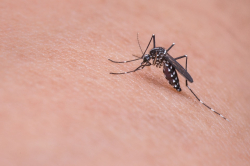Mosquito Control
Some mosquitoes can spread viruses like West Nile that make people sick. Some mosquitoes are nuisance mosquitoes that bite people but do not spread disease. Everyone can play a role in controlling mosquitoes.
Here, you can learn about the importance of mosquito control, community-level control efforts, and what you can do to make a difference at home.
Deschutes County does not have a mosquito control program. This page is informational only.
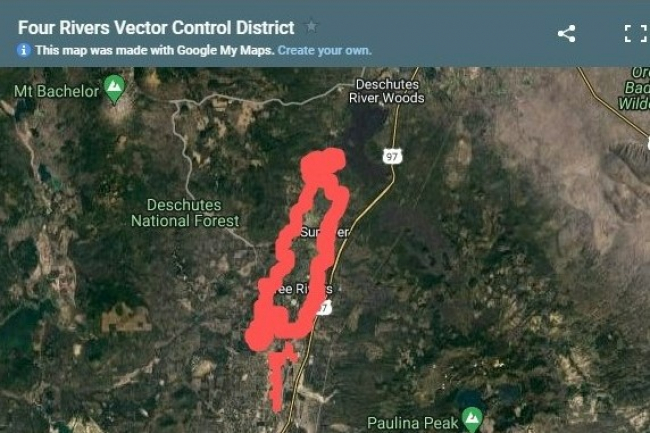
In specific parts of southern Deschutes County, the Four Rivers Vector Control District performs vector control. Check the map on the Four Rivers Vector Control website (link below) to see whether you live inside their district boundary. If you live in the Four Rivers Vector Control District Treatment area and have a mosquito complaint, you can report it on their website. Please note that they are not able to control mosquitoes outside of the boundaries of their district.
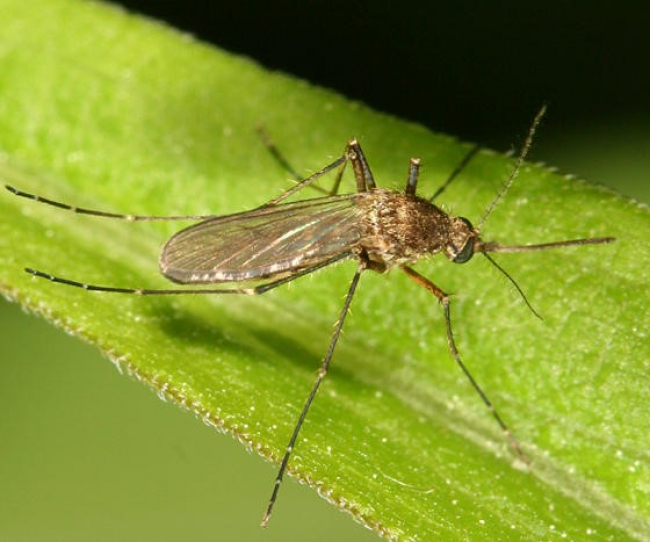
Mosquitoes
Mosquitoes are insects belonging to the order Diptera, the True Flies. Like all True Flies, they have two wings, but unlike other flies, mosquito wings have scales. Female mosquitoes' mouthparts form a long piercing-sucking proboscis. Males differ from females by having feathery antennae and mouthparts not suitable for piercing skin. A male mosquito's principal food is nectar or similar sugar source.
There are over 3,000 different species of mosquitoes throughout the world; currently 176 species are recognized in the United States. Each mosquito species has a Latin scientific name, such as one of the main mosquitoes found in Central Oregon, Aedes vexans. Aedes is the "generic" name of a group of closely related mosquitoes and vexans is the "species" name that represents a group of individuals that are similar in structure and physiology and capable of interbreeding. These names are used in a descriptive manner so that the name tells something about each particular mosquito.
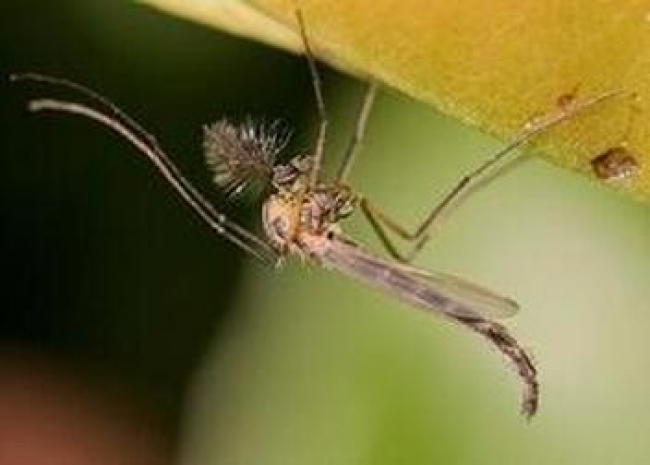
The insects that are most commonly mistaken for mosquitoes are called midges. Midges are true flies that are closely related to mosquitoes, and resemble them somewhat, but most midges are non-biting. Midges can emerge and fly any day of the year when the air is warm enough, even in mid-winter. Since most midge species are attracted to light, they are often found on the exterior surfaces of houses, or on windows and doors.
Midges are not harmful and cannot transmit diseases like West Nile virus. Unlike the mosquito, midges lack the sucking mouthparts (proboscis) used in feeding on blood and nectar. Most midges have no ability to bite and do not carry any human diseases.
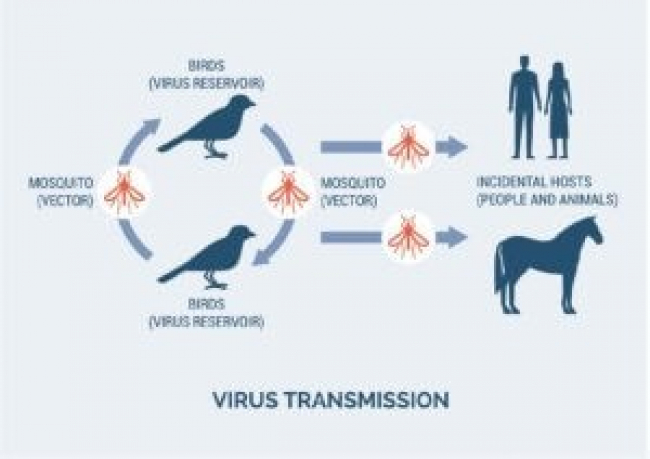
Mosquito Diseases
Whether you live out in the country, in the city or in a suburban neighborhood, you may be bothered by mosquitoes. Besides being annoying pests, some mosquitoes can transmit diseases to humans and domestic animals. There are two main mosquito-borne diseases of concern in Deschutes County.
West Nile Virus
West Nile Virus (WNv) is traditionally found in parts of Asia, eastern Europe, Africa, and the Middle East. The virus was first detected in the United States in 1999 in New York City. Since then, it has spread across the North American continent. In Deschutes County, WNv was first detected in 2006.
In nature, birds are typically the primary reservoir host for WNv. When a mosquito bites an infected bird, it can spread the virus to other birds, people, and mammals, such as horses, that it bites. People, horses, and other mammals are “dead end hosts”, meaning they cannot spread the virus any further. WNv is usually associated with mild flu-like symptoms but, in rare cases, it can cause encephalitis, or inflammation of the brain. WNv can be fatal when this occurs.

Western equine encephalitis
Western equine encephalitis (WEE) is a viral disease that circulates naturally in birds and can be transmitted to horses and people through the bite of an infected mosquito. Most human cases are associated with a sudden onset of symptoms like fever, headache, muscle stiffness, and vomiting. However, WEE can potentially cause swelling of the brain, resulting in numerous long-lasting neurological conditions or death. There is no cure for WEE in humans so supportive care is the only option once infection occurs.
In horses, the mortality rate for WEE infections is about 20-40%. Symptoms include lethargy, staggering, recumbency, walking in circles, seizures, and various other neurological conditions. There is no cure for WEE in horses, but a preventative vaccine is available. Good vector control practices are also crucial for preventing WEE. Practices such as using repellents, keeping horses inside at night when mosquitoes are most active, and eliminating mosquito breeding sources will help reduce WEE risk.
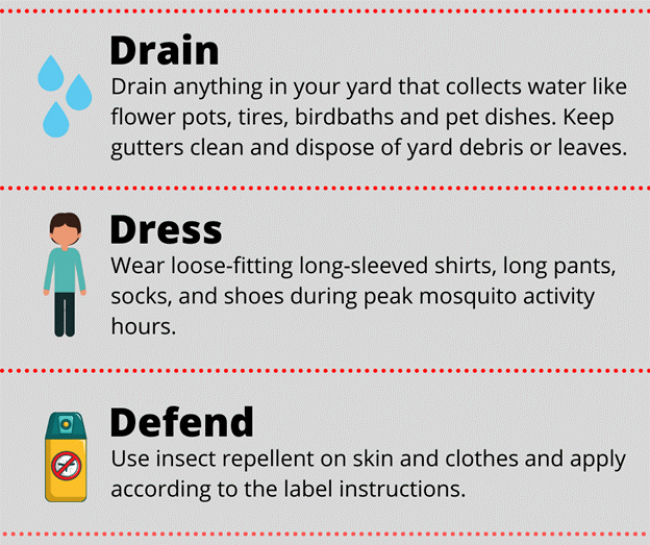
Protect Yourself
If you know something about where mosquitoes lay their eggs, how they live, and what can be done to prevent and control them, you will be able to reduce the number of mosquitoes in and around your home.
Remember the 3 Ds of Mosquito Prevention!
DRAIN – Most of a mosquito’s life cycle takes place near or in water so check around your home for sources of standing water and eliminate them.
DRESS – Loose fitting, long-sleeved shirts and pants make it more difficult for a mosquito to bite you. Socks and shoes are helpful since some mosquitoes like to bite around the ankles. Light colored clothing also tends to be less attractive to mosquitoes.
DEFEND – Use an insect repellent containing an EPA approved ingredient such as DEET or Picaridin. Organic alternatives include citrus oil, eucalyptus, and citronella. Always follow label directions!
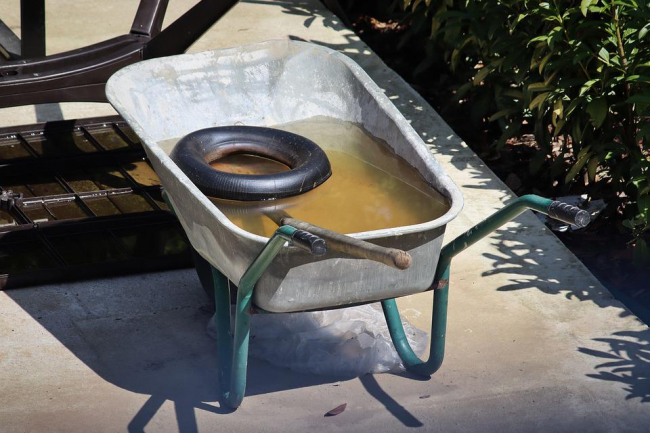
Are you raising mosquitoes? Consider these common breeding areas and how to get rid of them.
MOSQUITO SOURCES AND WHAT TO DO
Containers of various sorts: Empty or dispose of containers
Ponds: Stock with Mosquito Fish and remove excess vegetation
Irrigated Lawns and Fields: Avoid over irrigation and drain standing areas
Bird baths: Change water frequently
Swimming Pools: Use filter regularly, when not in use, empty or cover tightly
Roof gutters: Clean frequently to remove blockage
Open ditches: Drain to stream or channel system or other outlet
Tires: Empty water inside
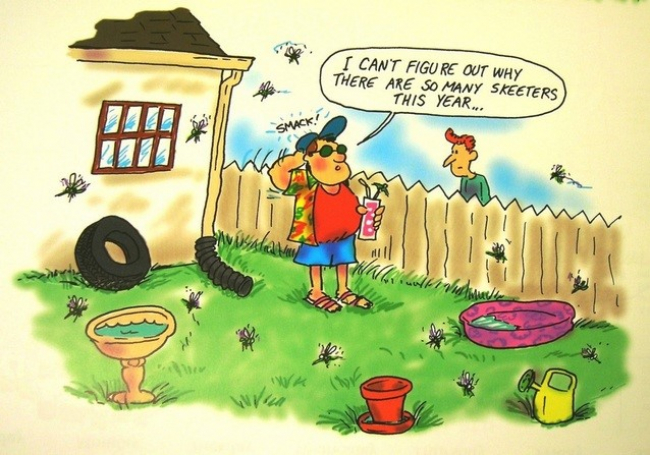
Here are some tips for protecting yourself from mosquitoes:
- Use Insect Repellent
- Wear long sleeve shirts and pants
- Screen windows and doors
- Drain ALL standing water!
- Stay indoors during peak feeding times (especially at dawn and dusk)

